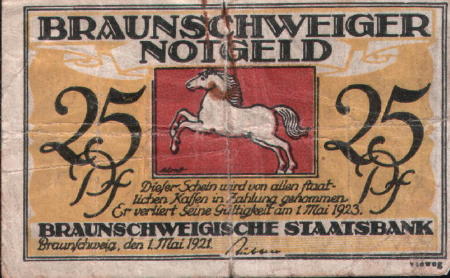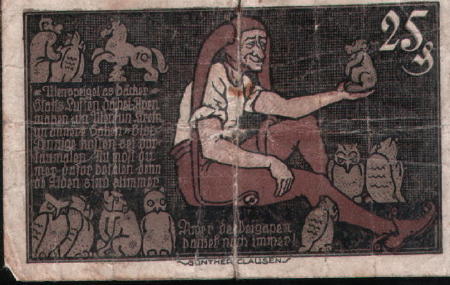Quite by accident, I found an oddity in a box of paper money which was for sale, and the seller gave it to me because it was slightly torn. I really didn’t care, because something about it intrigued me, and I figured once I scanned it and had the image, no one would care whether it was torn, and it would be mine forever! In my hard drive, the place where nothing ages.

That’s the front side, which indicates that what I have is a 1923 25 pfennig banknote from the Braunschweig area (“Braunschweger notgeld“), and as I was able to ascertain, this was a regional state of the Weimar government, which doesn’t appear to have been a very well-run place:
Strike movements coined/shaped the years 1917 and 1918, whereby beside economical conditions increasingly also the political conditions were criticized. Braunschweig developed to a junction of radically left-wing currents, after the largest part of the SPD members the 1917 again-created USPD (an independent socialist party of Germany) had occurred. Under the guidance of August Merges came it already on 2 November to a mass meeting on the Leonhardplatz. Merges belonged beside the USPD member and influential Anarchisten Sepp Oerter, which was in the years a 1920/1921 Prime Minister of the country, to the pioneers of the revolutionary changes. The learned cutter August Merges was active since 1911 by its contacts to the “people friend”, since 1871 appearing and in the people friend house (also “red lock” mentioned) a manufactured social-democratic newspaper, in Braunschweig. During the war it had itself in prominent position in the “revolution club”, a union of war opponents, and in the “Spartakusbund” engages. Revolution-well-behaved conditions, which accompanied with prisoner releases, plunderings and occupations, broke already two days off in Braunschweig in former times as in Berlin on 7 November 1918. Representatives of a again educated worker and soldier advice, at whose point August Merges stood, demanded the resignation of duke Ernst August on 8 November. Since this signed after short hesitating still on the same day it submitted deed of abdication, the seizure of power remained unblutig by the worker and soldier advice. This important event lived approx.. 20,000 humans in tension-loaded atmosphere at the lock place. Already two days later, on 10 November 1918, the socialist Republic of Braunschweig was proclaimed and the federal state parliament dominated by the USPD was occupied.
(My apologies for a very poor translation.) There’s more, and Braunschweig fell on harder and harder times, eventually playing an unfortunate role in Hitler becoming a naturalized citizen, and ultimately falling under Nazi rule and losing statehood (summarized here).
But I depart from the mystery involving my banknote, which turns out to me emergency inflation currency from the Weimar era. The abominable translation continues (the text is to the right of another banknote of similar design):
Emergency money light from the time of inflation of the Weimar Republic source: City archives Braunschweig, Sign.: H VII: 257 Up to the currency reform 1923 it by rising monetary depreciations and the introduction from coins, due to scarcity of raw materials, came to the spreading of emergency money lights. Despite progressive and reform measures and developments in the 20’s, like the social housing construction beginning and the development of cultural life and leisure-time facilities in the city, the situation was intensified again appreciably by the world economic crisis 1929. The number of the unemployed persons rose dramatically, so that particularly in the numbers of the middle class increasingly the influence of the NSDAP [Nazi Party] could be established. These developments of National Socialist tendency at the press organ mentioned “Braunschweiger people friend” are clarified, which increases under political pressure turned out and whose last expenditure appeared on 2 March 1933.
But the piece of paper really got exciting when I tried to figure out what was on the reverse:

Looking for owls on Braunschweig “Notgeld” banknotes, it didn’t take me long to figure out that what I had pertained to Till Eulenspiegel. The various denominations of currency ffrom the Brauschweig staatsbank featured various pictures of Till Eulenspiegel by artist Gunther Clausen. While owls were also featured on other German currency from the period, Till Eulenspeigel is of particular note because according to legend, he was born in Braunschweig, and his name means Owlglass:
…tales are retold from a book that was first printed around 1500 AD as Ein kurzweiliges Buch von Till Eulenspiegel aus dem Lande Braunschweig (A Brief Book on Till Owlglass from Braunschweig Country), and attributed to Hermann Bote. It is one of the most popular books ever that originates in German, and has been translated into many languages. The book consists of farce tales, and Till is a clown.
Hence the owl.
Hmmmm….. Closer.
But learning that “Eulenspiegel” meant “Owlglass” wasn’t fully satisfying, because it didn’t explain the image on my note. I kept looking, and I finally found the explanation in the form of Tale 61:
History 61 tells about Till’s work for a master baker. One evening his master tells Till – meaning it as ajoke – that he should bake owls and long-tailed monkeys. The next day the master is very angry when he realizes that Eulenspiegel has really filled the bakery with bread formed like owls and long-tailed monkeys baked from the dough he was supposed to make normal bread with.
That is Till’ strategy: He takes every word he is told at face value. After Till has paid for the dough his master chucks him out and Till leaves the bakery with all the funnily fomed bread. He goes back to Braunschweig where he is able to sell his bread to the poeple. Finally he makes more money than he has paid to the master baker.
Eulenspeigel is known as the original Merry Prankster, and of course his pranks were the inspiration for Strauss’s wonderful “Till Eulenspiegel’s Merry Pranks,” with which most classical music fans will be familiar. (Here’s a link to a short clip.)
Until today, I didn’t know he made it onto the money.
The power of his legend may explain why no one took the money seriously.
I mean really. Suppose Bush decided to put, say The Three Stooges, or Bozo the Clown on United States currency?
The econony might never fully recover.
Comments
One response to “Merry Prankster money”
More curiously, how did he become the patron saint of the Eulenspiegel Society? Or is there a ‘secret history’ of Brauschweig waiting to be told?
I know Paul Bowles had a lot to say about Weimar party time, but is this part of it?